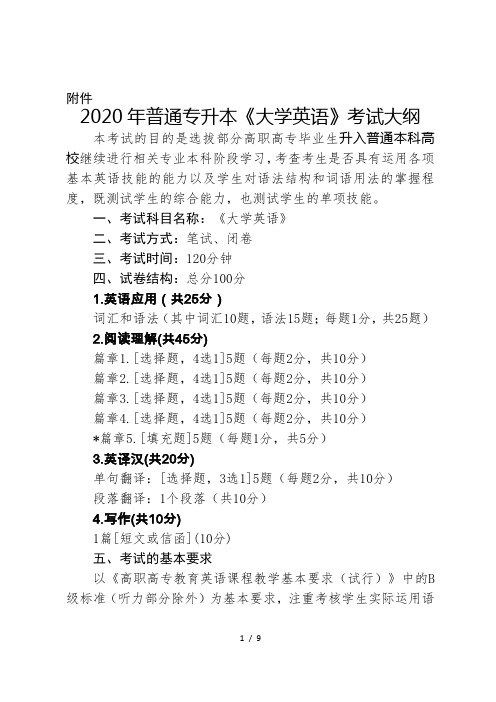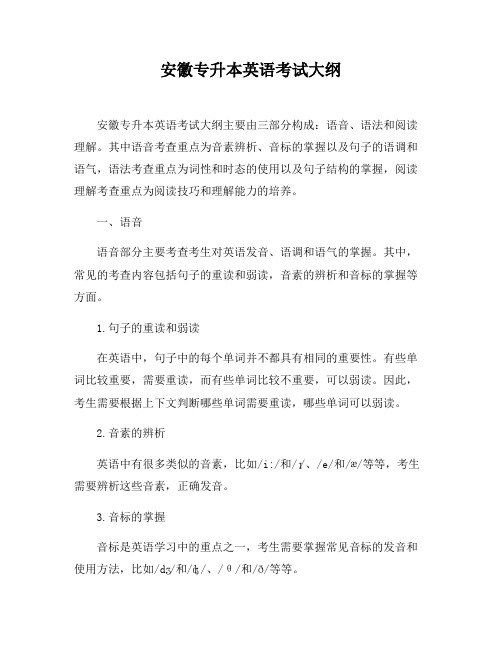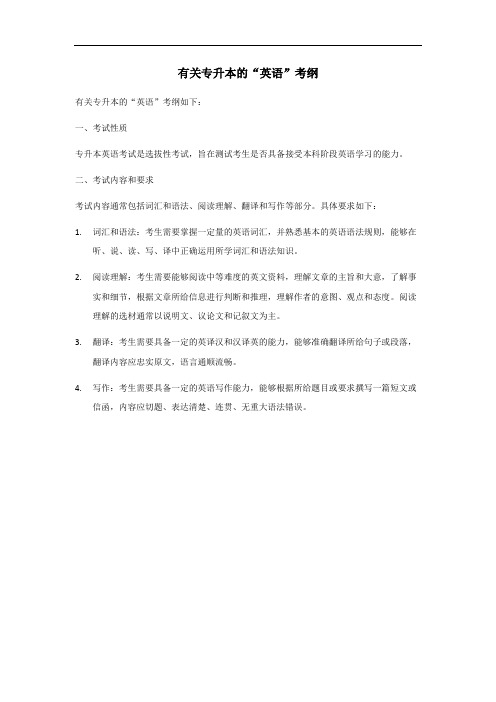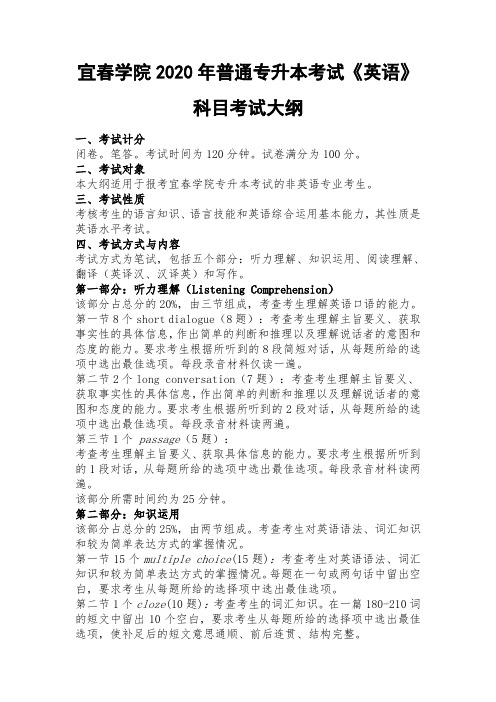安徽科技学院2020年普通专升本《英语》考试大纲
2020年普通专升本《大学英语》考试大纲

附件2020年普通专升本《大学英语》考试大纲本考试的目的是选拔部分高职高专毕业生升入普通本科高校继续进行相关专业本科阶段学习,考查考生是否具有运用各项基本英语技能的能力以及学生对语法结构和词语用法的掌握程度,既测试学生的综合能力,也测试学生的单项技能。
一、考试科目名称:《大学英语》二、考试方式:笔试、闭卷三、考试时间:120分钟四、试卷结构:总分100分1.英语应用(共25分)词汇和语法(其中词汇10题,语法15题;每题1分,共25题)2.阅读理解(共45分)篇章1.[选择题,4选1]5题(每题2分,共10分)篇章2.[选择题,4选1]5题(每题2分,共10分)篇章3.[选择题,4选1]5题(每题2分,共10分)篇章4.[选择题,4选1]5题(每题2分,共10分)*篇章5.[填充题]5题(每题1分,共5分)3.英译汉(共20分)单句翻译:[选择题,3选1]5题(每题2分,共10分)段落翻译:1个段落(共10分)4.写作(共10分)1篇[短文或信函](10分)五、考试的基本要求以《高职高专教育英语课程教学基本要求(试行)》中的B 级标准(听力部分除外)为基本要求,注重考核学生实际运用语1 / 9言的能力。
六、考试范围1.词汇。
掌握2500个英语单词以及由这些词构成的常用词组,对其中1500左右的单词能正确拼写,英汉互译。
2.语法。
掌握基本的英语语法规则,在听、说、读、写、译中能正确运用所学语法知识。
3.阅读。
能阅读中等难度的一般题材的简短英文资料,理解正确。
在阅读生词不超过总词数3%的英文资料时,阅读速度不低于每分钟50词。
能读懂通用的简短实用文字材料,如信函、产品说明等,理解基本正确。
4.翻译(英译汉)。
能将中等偏下难度的一般题材的文字材料和对外交往中的一般业务的英文材料译成汉语。
理解正确,译文达意,格式恰当。
5.写作。
能运用所学词汇和语法写出简单的短文;能用英语填写表格和简短的英语应用文,如便函、简历、通知等。
安徽专升本英语考试大纲

安徽专升本英语考试大纲安徽专升本英语考试大纲主要由三部分构成:语音、语法和阅读理解。
其中语音考查重点为音素辨析、音标的掌握以及句子的语调和语气,语法考查重点为词性和时态的使用以及句子结构的掌握,阅读理解考查重点为阅读技巧和理解能力的培养。
一、语音语音部分主要考查考生对英语发音、语调和语气的掌握。
其中,常见的考查内容包括句子的重读和弱读,音素的辨析和音标的掌握等方面。
1.句子的重读和弱读在英语中,句子中的每个单词并不都具有相同的重要性。
有些单词比较重要,需要重读,而有些单词比较不重要,可以弱读。
因此,考生需要根据上下文判断哪些单词需要重读,哪些单词可以弱读。
2.音素的辨析英语中有很多类似的音素,比如/i:/和/ɪ/、/e/和/æ/等等,考生需要辨析这些音素,正确发音。
3.音标的掌握音标是英语学习中的重点之一,考生需要掌握常见音标的发音和使用方法,比如/dʒ/和/ʤ/、/θ/和/ð/等等。
二、语法语法部分主要考查考生对英语词法和句法的掌握。
其中,常见的考查内容包括词性和时态的使用以及句子结构的掌握等方面。
1.词性和时态的使用英语中有很多种不同的词性和时态,考生需要掌握它们的基本用法和用法区别,比如动词的三态、不规则动词的过去式和过去分词、形容词和副词的比较级和最高级等等。
2.句子结构的掌握英语句子的结构比较复杂,考生需要掌握常见的句子结构和各种句子成分的用法,以便正确理解和使用英语句子。
常见的句子结构有简单句、复合句、并列句等等。
三、阅读理解阅读理解部分主要考查考生的阅读技巧和阅读理解能力。
其中,常见的考查内容包括理解文本的中心思想、推断作者的意图、辨析词义以及根据上下文理解单词等方面。
1.理解文本的中心思想阅读理解中最基本的能力就是理解文本的中心思想,即从文章中抓住主要内容,快速理解文章让我们知道了什么,为之后的分析和推断打下铺垫。
2.推断作者的意图在阅读理解中,往往需要读者去深入阅读文章,从中获取作者表达想法的全貌,并从中推断作者的意图和思考。
安徽2020年普通专升本专业课考试大纲《综合英语》

综合英语一、考试目标与要求《综合英语》课程考试旨在考核学生对本课程知识的掌握和运用能力,包括英语语言在词法、句法、语法等方面的基础知识,具备良好的听、说、读、写、译技能,一定的商务知识和跨文化交际能力,能够比较熟练地运用所学知识和技能在日常语境和涉外交际语境中发现问题、分析问题以及解决问题。
参照教材《英语综合教程》1-4册(陈永捷等主编,高等教育出版社,2016,第2版),确定该科目专升本招生考试的考核目标与要求。
二、考试范围与要求第一项词汇(Vocabulary)本部分测试考生对英语专业四级考试所要求的4000-5000左右词汇的运用。
考核知识点:了解英语单词的基本构词规则;熟悉近义词及形似词的含义和用法;掌握其中3000-3500左右常用词及其惯用搭配,并能准确把握不同语境下同一单词的不同词义。
第二项语法(Grammar)本部分测试考生的基本语法知识,包括名词、代词、数词、介词和介词短语、连词、形容词(比较级和最高级)、副词(比较级和最高级)、冠词、动词、时态、被动语态、非谓语动词、构词法、句子种类、句子成分、简单句的基本句型、主谓一致、并列复合句、主从复合句、间接引语、省略、倒装、强调、虚拟语气等。
考核知识点:了解中文和英文两种语言在句法和语法方面的基本差异;熟识并掌握英语语言的句法特点和语法规则;掌握英语语法的实际运用。
第二项完形填空(Cloze)本部分测试考生在所要求的词汇储备和语法知识的范围内能够综合运用语言技能(如选词妥贴、构句严谨、语法规范)和思维能力(如判断、推理、归纳、演绎)。
在一篇题材熟悉、难度适中的短文内留有20个空格,每一个空格为一题,每题有四个选择项。
考生应通读全文,在理解文章大意的基础上选择最佳答案,使文章的意思和结构完整。
考核知识点:了解连贯性和一致性等段落特征;熟悉句子的内部结构,并着重把握句子与句子之间的逻辑关系;掌握动词辨析、名词辨析、形容词辨析等,常用单词的熟词僻义及词性用法。
安徽专升本英语考纲

有关专升本的“英语”考纲
有关专升本的“英语”考纲如下:
一、考试性质
专升本英语考试是选拔性考试,旨在测试考生是否具备接受本科阶段英语学习的能力。
二、考试内容和要求
考试内容通常包括词汇和语法、阅读理解、翻译和写作等部分。
具体要求如下:
1.词汇和语法:考生需要掌握一定量的英语词汇,并熟悉基本的英语语法规则,能够在
听、说、读、写、译中正确运用所学词汇和语法知识。
2.阅读理解:考生需要能够阅读中等难度的英文资料,理解文章的主旨和大意,了解事
实和细节,根据文章所给信息进行判断和推理,理解作者的意图、观点和态度。
阅读理解的选材通常以说明文、议论文和记叙文为主。
3.翻译:考生需要具备一定的英译汉和汉译英的能力,能够准确翻译所给句子或段落,
翻译内容应忠实原文,语言通顺流畅。
4.写作:考生需要具备一定的英语写作能力,能够根据所给题目或要求撰写一篇短文或
信函,内容应切题、表达清楚、连贯、无重大语法错误。
普通专升本考试《英语》科目考试大纲

宜春学院2020年普通专升本考试《英语》科目考试大纲一、考试计分闭卷。
笔答。
考试时间为120分钟。
试卷满分为100分。
二、考试对象本大纲适用于报考宜春学院专升本考试的非英语专业考生。
三、考试性质考核考生的语言知识、语言技能和英语综合运用基本能力,其性质是英语水平考试。
四、考试方式与内容考试方式为笔试,包括五个部分:听力理解、知识运用、阅读理解、翻译(英译汉、汉译英)和写作。
第一部分:听力理解(Listening Comprehension)该部分占总分的20%,由三节组成,考查考生理解英语口语的能力。
第一节8个short dialogue(8题):考查考生理解主旨要义、获取事实性的具体信息,作出简单的判断和推理以及理解说话者的意图和态度的能力。
要求考生根据所听到的8段简短对话,从每题所给的选项中选出最佳选项。
每段录音材料仅读一遍。
第二节2个long conversation(7题):考查考生理解主旨要义、获取事实性的具体信息,作出简单的判断和推理以及理解说话者的意图和态度的能力。
要求考生根据所听到的2段对话,从每题所给的选项中选出最佳选项。
每段录音材料读两遍。
第三节1个passage(5题):考查考生理解主旨要义、获取具体信息的能力。
要求考生根据所听到的1段对话,从每题所给的选项中选出最佳选项。
每段录音材料读两遍。
该部分所需时间约为25分钟。
第二部分:知识运用该部分占总分的25%,由两节组成。
考查考生对英语语法、词汇知识和较为简单表达方式的掌握情况。
第一节15个multiple choice(15题):考查考生对英语语法、词汇知识和较为简单表达方式的掌握情况。
每题在一句或两句话中留出空白,要求考生从每题所给的选择项中选出最佳选项。
第二节1个cloze(10题):考查考生的词汇知识。
在一篇180-210词的短文中留出10个空白,要求考生从每题所给的选择项中选出最佳选项,使补足后的短文意思通顺、前后连贯、结构完整。
2020年普通高等教育专升本招生考试科目考试大纲

2020年普通高等教育专升本招生考试科目考试大纲
根据教育部的规定,2020年普通高等教育专升本招生考试科目考试大纲如下:
1. 政治理论考试大纲:
- 马克思主义基本原理
- 中国特色社会主义理论体系
- 中国共产党的基本理论、基本路线、基本纲领、基本经验 - 当代世界的主要政治经济社会问题
- 中国特色社会主义事业和党的建设的历史性成就、历史性变革及其原因等
2. 英语考试大纲:
- 英语语法、阅读理解
- 写作
- 翻译
- 听力理解
3. 专业相关课程考试大纲:
- 专业基础知识和基本理论
- 专业应用能力和实践能力
- 专业发展方向和前沿技术
此外,根据不同的专业和学校的要求,还可能包括其他科目的考试,如数学、物理、化学、历史、地理等。
具体的考试大纲可以参考各个学校的招生章程或招生简章。
安徽2020年专升本考试专业课程考试大纲《翻译与写作》
安徽外国语学院2020年英语专业专升本招生考试《翻译与写作》考试大纲一、考试性质本大纲为英语专业本科专升本学生专门编写,作为考试命题依据。
该课程是英语专业的专业必修课程,目的是在学生已有的英语基础上,培养学生运用英语进行翻译和写作的专业技能。
通过课程的理论学习和实践练习,使学生能恰当地,随机应变地熟练结合所学语言及翻译技巧,完成基本英汉互译任务。
另外使学生具备良好的遣词造句、谋篇布局的能力,提高学生用英语准确表达思想,熟练运用英语进行各种文体写作的能力,为今后从事实际工作提供必要的知识和能力准备。
二、考试基本要求根据《英语类专业本科教学质量国家标准》与本校制定的《英语专业本科教学大纲》的要求,旨在考查考生的英语翻译能力和写作表达能力。
三、考试基本内容:翻译方面:翻译的基本概念、翻译的标准、翻译的过程及方法、翻译的语言对比规律、翻译的基本技巧及实用文体翻译。
写作方面:第一章英语句子写作内容:英语基本句型;基本句型的扩展;句子结构常见错误;主谓一致;标点符号第二章英语段落写作内容:段落的构成;段落的一致性与连贯性;句子的多样性第三章英语段落扩展内容:描述;定义;例证;划分与分类;比较与对照;因果关系;论证第四章英语短文写作内容:英语短文的构成;英语短文写作程序;英语短文的类型第四章写作中思辨能力的培养内容:议论文写作第五章英语应用文写作内容:书信;其他日常应用文第六章大学英语作文写作内容:段首句写作;关键词写作;提纲作文四、考试方式及试题类型1、考试方式:闭卷,考试分值150分2、试题类型及结构翻译方面:单句翻译:要求句意通顺,符合英文或汉语的行文特色;并对句中内涵有一定的表达。
短文翻译:英译汉要求翻译英语国家出版的一般难度的文章和材料,译文应忠实于原文,表达流畅,翻译速度为每小时250-300个英文单词左右。
汉译英要求翻译我国书刊杂志上的普通文章和材料,译文应忠实于原文,表达流畅,翻译速度为每小时250-300个汉字左右。
安徽2020年普通专升本《基础英语》科目考试大纲
阜阳师范大学2020年普通专升本招生专业课考试大纲
《基础英语》科目考试大纲
一、考试目的与要求
本考试的目的是遴选部分具有扎实的英语语言基本功的优秀英语专业专科生进入大学本科专业的高年级阶段学习,主要考核学生对语法结构、词汇量、阅读、英语专业基础知识的掌握程度,既测试学生的综合能力,也测试学生的单项技能。
二、考试内容及试卷结构
I、考试内容
试卷包括语法和词汇、阅读理解、完形填空、选择搭配题和英语写作四个部分。
1、语法和词汇:本题为多项选择题,由30小题组成,每题有四个选择项,每题1分,共30分。
主要测试考生对词汇、短语、语法结构以及基本语法概念的掌握。
2、阅读理解:本题为多项选择题,共有5篇短文,短文长2000个词左右。
每篇短文后有5道选择题。
考生应根据文章内容从每题四个选项中选出一个最佳答案。
共25题,每题2分,共50分。
要求考生具有根据语境推理、猜词的能力,理解主旨大意、分析文章作者态度、语气和一定的判断和推论能力。
主要测试学生通过阅读获取信息的能力。
3、完形填空:本题为多项选择题。
在一篇250词左右、题材熟悉、难度中等的短文中留有二十个空格。
每个空格为一题,每题有四个选择项。
共20题,每题1.5分,共30分。
要求考生在全面理解所给短文内容的基础上选择一个最佳答案使短文的意思和结构恢复完整。
主要测试学生运用语言的综合能力。
安徽2020年专升本《专业英语》考试大纲
2020年专升本《专业英语》考试大纲一、总纲本大纲适用于:安徽省属普通高校(以及经过批准举办普通高等职业教育的成人高等院校)的应届全日制普通高职(专科)毕业生;安徽省高校毕业的具有普通高职(专科)学历的退役士兵。
考试是国家承认的招收专科学生升入本科阶段学习的选拔性考试,旨在考核学生对于本课程是否达到进入本科学习水平的基本要求。
考试需在统一规定的时间内,采用闭卷方式进行。
本大纲旨在规定课程学习和考试的内容和范围,是实施课程考试的重要依据,也是指导学生高效学习的纲领性文件,有助于考试标准的规范化和具体化。
本大纲的制定旨在贯彻国家和安徽省的相关要求,依据有关政策文件,根据“宽口径、厚基础、强能力、高素质”的原则,实现培养具有扎实英语语言基础知识和较强听、说、读、写、译技能人才的目标。
测试考生对语言知识的掌握以及对语言的应用情况。
为了有效考核学生综合运用各项基本技能的能力,既兼顾考试的科学性、客观性,又考虑到考试的可行性以及基础阶段英语水平测试评估的特点,考试为闭卷考试,采用客观试题与主观试题相结合的方式。
大纲最终解释权归安徽财经大学商学院。
二、学科考查内容纲要(一)考核目标与要求本课程考试参考书目:《大学英语精读》(第三版)1-3册,董亚芬著,上海外国教育出版社,2011年英语专业课程考试属于考生参加的选拔性考试,考试目的是全面检查学生是否达到课程教育大纲所规定的各项要求,考核学生对英语词汇、语法结构、英语常用句型的掌握情况以及语篇的阅读理解能力,了解英语各种文体的表达方式,要求考生具备一定的口头和笔头表达能力,为之后本科阶段英语专业的学习打下扎实的专业基础。
具体包括:1.能力目标为学生打好扎实的语言基础的同时,进一步培养和提高学生各项英语语言应用能力;培养学生分析、推理、归纳、综合等思考能力和表述、研讨、争辩、应答等语言运用能力。
2.知识目标掌握必要的基础语言知识:词汇、语法、句法结构。
3.素质目标培养学生的思想道德素质、文化素质、心理素质;培养学生的思维能力和创新能力。
2020安徽省专升本英语考试真题及答案
2020安徽省专升本英语考试真题及答案全文共6篇示例,供读者参考篇1The 2020 Anhui English Test? Oh boy, that was a real doozy! I'll tell you all about it.So it was back in June 2020 and all us kids had been studying real hard to get into a good university program. My parents were helping me with practice tests and making me do lots of English homework. I didn't mind too much because I really want to become a scientist when I grow up and you have to know good English for that.Anyway, the week before the big test I was pretty nervous. What if I messed up and didn't get a good score? I tried not to think about it too much and just focused on reviewing all the vocabulary and grammar rules I had learned over the past few years.Finally test day came! We all had to get to the exam site super early in the morning. I remember my mom making me a big breakfast to "feed my brain" before we left. Once we got there, it was just a regular classroom setting but theatmospshere was really tense. Everyone was quietly going over their notes one last time.The first part of the test was listening comprehension. They played all these dialogues and passages and we had to answer multiple choice questions about what we heard. That's always my weakest section because the speakers go so fast! I probably missed quite a few of those.Next up was reading comprehension. We had to read a few longer passages and answer detailed questions about the main ideas, vocabulary in context, making inferences, that kind of thing. I felt a little better about this section since I'm a pretty strong reader. Some of the passages were a little complex though.After that was the writing section where we had to write a short essay responding to a prompt. The prompt I got was "Describe your favorite teacher and explain why this person had such an influence on you." I tried my best to organize my essay logically with clear examples and no grammar mistakes.Finally, the last part tested our knowledge of English vocabulary, grammar, and idiomatic expressions through individual multiple choice questions. Yikes, some of those werepretty tricky! I ran out of time at the end and had to rapidly fill in the remaining bubbles.When it was all over, I just felt relieved to have that intense experience behind me. My brain was fried! We had a short break before the math portion of the exam in the afternoon. I wolfed down my lunch and tried to relax a bit.A couple weeks later, the scores finally came out. I didn't do quite as well as I'd hoped on English, but my overall score was good enough to qualify me for the university program I wanted. Phew! All that hard work had paid off.My parents took me out for a celebratory dinner that night. As we ate, they reminded me that getting into a good university is just the first step. Once classes start in the fall, I'll need to stay focused and keep working super hard to succeed. No slacking off!I just nodded and smiled as I devoured my dessert. One challenge down, many more to come! But I'm ready to take them on. Maybe I'll even try to get straight A's so I can become THE top student at the university. We'll see!Well, that's the full scoop on my experience with the big 2020 Anhui test. It was a lot of pressure, but also great practicefor future academic challenges awaiting me. Here's to many more adventures in learning and growing! Catch ya later!篇2The 2020 Anhui English TestHi there! My name is Li Ming and I'm a 5th grade student at Sunshine Elementary School in Hefei, the capital city of Anhui Province. Today I wanted to tell you all about the big English test that university students had to take last year in my province. It was a really important test called the Anhui Province English Test for upgrading from junior college to university. I didn't take the test myself because I'm still in elementary school, but my big sister Jing took it when she was trying to get into a university program after junior college. She studied really hard for months!The test had four main sections - listening, reading, writing, and translation. Jing said the listening part was super hard because you had to listen really carefully to conversations and passages in English and answer questions about the details. One conversation was between two friends deciding what movie to see. Another passage was about how to stay healthy by eating right and exercising. Jing had to listen and then answer multiple choice questions to show she understood.The reading section had a bunch of different passages - stories, articles, advertisements, and more. Jing had to read each one carefully and then answer comprehension questions about the main ideas, details, vocabulary words, and making inferences. One passage was about the history of the compass and another was about environmental protection. There were also questions about the authors' opinions and tones. It took a lot of concentration!For the writing part, Jing had to write a short essay of around 200 words in a limited time. The prompt could be about anything - her favorite book, an influential person in her life, the importance of friendship, or changes she would make to improve her hometown. She had to plan her essay, write a strong introduction, body paragraphs with good examples, and a conclusion. The graders checked her grammar, vocabulary, organization, and how well she responded to the prompt.The last section was translation - both translating a passage from English into Chinese and from Chinese into English. Jing had to make sure her translations were accurate and made sense in the other language. Some of the words and phrases were really confusing and idiomatic!In the end, Jing got a good score on the test and was admitted to a great university program. Phew, I was so proud of her! The test was no joke - it tested every aspect of her English skills from listening and reading to writing and translation. I definitely have a few more years before I need to start worrying about that kind of intense English exam. For now, I'll just keep practicing my vocabulary and trying to get good grades!Anyway, that's the scoop on the 2020 Anhui English test from my perspective as a little kid. Let me know if you have any other questions! I may not be a university student yet, but I'm happy to explain things as best I can. Thanks for reading and bye for now!篇3My Big English Test Adventure!Hi everyone! My name is Lily and I'm 10 years old. I just took a really big English test a few days ago and I wanted to tell you all about it. It was called the 2020 Anhui Province English Test for Associate's Degree Admissions. That's a really long name, isn't it?I had to practice saying it over and over so I wouldn't forget it.My mom said this test was super important if I wanted to go to a good university later on. I wasn't really sure what an"associate's degree" was, but I knew I had to do my best. We've been studying English at school since I was very little, but this test was going to be much harder than anything I'd done before.A few weeks before the test, my teacher Ms. Wang gave us a big study guide with practice questions. She said it would help get us ready. Some of the questions looked so tricky! There were readings that we had to answer comprehension questions about, grammar sections, vocabulary filling the blanks, and even writing a short essay. I was a little nervous.But Ms. Wang told us not to worry too much. She said as long as we studied hard, we would be just fine. So that's what I did - I studied hard every night after school with my mom helping me. We read through all the practice readings, worked on grammar rules, and made flashcards for vocabulary words. It was a lot of work, but I knew it was important.Finally, the big day came - test day! I had to wake up super early so I wouldn't be late. I put on my lucky hair clips and my mom made me a special breakfast to get me energized. Then we headed to the testing site. There were so many other students there, it was crazy! We all had to get settled into our desks and follow all the rules very carefully.The first section was the reading comprehension. I read through each passage slowly and tried to understand all the details. For the questions, I eliminated the answers that didn't make sense and chose the one that seemed right based on the reading. Piece of cake!Next up was grammar and vocabulary. There were a lot of questions about verb tenses, prepositions, and fancy vocabulary words. I just thought back to everything Ms. Wang taught us and tried my best. I really hoped I was bubbling in the right answers on my answer sheet.After a short break, we had to write an essay about our favorite Olympic sport. I decided to write about gymnastics because I'm obsessed with that. I made sure to plan out my intro, body paragraphs, and conclusion like we practiced in class. Writing has always been one of my strengths!The very last section was listening comprehension. We had to listen to recordings about different topics and answer questions. It was hard to concentrate for so long! But I kept focused and used the strategies Ms. Wang taught us, like listening for key details.After what felt like forever, the test was finally over! I was so tired but really proud of myself for working so hard. I couldn'twait to find out my score. A few weeks later, the results came in the mail. I...PASSED! I got one of the highest scores in my class. Mom and Dad were jumping up and down cheering.Ms. Wang said my score was high enough that I could have a great shot at getting into a top university if I keep working just as hard. All that time studying English really paid off! Who knows, maybe I'll be an English teacher someday too.Well, that was my big English test adventure. It was tough, but I made it through with my determination and all the things I've learned over the years. I'm really glad my parents and teachers care so much about my education and future. I just need to stay focused and keep working hard in everything I do. The sky's the limit!篇42020安徽省专升本英语考试真题及答案嗨,大家好!我是小明,一个小学生。
- 1、下载文档前请自行甄别文档内容的完整性,平台不提供额外的编辑、内容补充、找答案等附加服务。
- 2、"仅部分预览"的文档,不可在线预览部分如存在完整性等问题,可反馈申请退款(可完整预览的文档不适用该条件!)。
- 3、如文档侵犯您的权益,请联系客服反馈,我们会尽快为您处理(人工客服工作时间:9:00-18:30)。
英语专业
【考试科目】
综合英语,翻译与写作
【考试范围】
综合英语:考核各项基本技能及词汇和语法结构,既测试单项技能,又测试英语综合运用能力。
从语法及词汇(Grammar and Vocabulary)、完形填空(Cloze)、阅读理解(Reading Comprehension)、句子翻译(Sentence Translation)、写作(Writing)等方面,考察英语专业专科阶段的学生是否达到了本科学生基础阶段所规定的各项英语专业技能要求。
翻译与写作:中国翻译历史回顾、翻译的性质及分类、翻译的基本原则和翻译教学的基本要求、翻译工作者的素质、英汉语言文化对比研究、语词的翻译、语句的翻译、语篇的优化、修辞与逻辑关系转换、新闻语体的翻译、文学语体的翻译、一般公文语体的翻译、广告语体的翻译、导游词的翻译、科技语体的翻译、法律语体的翻译、记叙文写作、议论文写作、说明文写作。
【参考书目】
陈永捷、梅德明等.英语(第二版)综合教程1.2.3.4(高职高专英语专业适用).高等教育出版社.2016年
陈永捷、梅德明等.英语(第二版)英汉汉英翻译教程(高职高专英语专业适用).高等教育出版社.2017年
陈永捷、梅德明等.英语(第二版)写作教程(高职高专英语专业适用).高等教育出版社.2016年。
